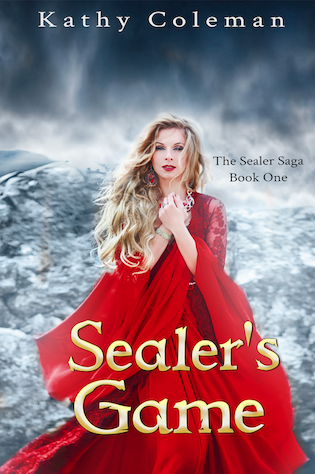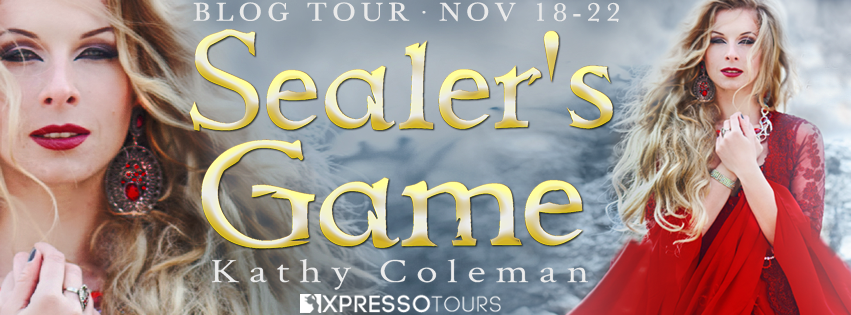
Sealer’s Game
Kathy Coleman
(Sealer Saga #1)
Publication date: October 22nd 2019
Genres: Adult, Fantasy, Romance
Hell hath no fury like a goddess scorned…
As Champion, Carita of Bel Auryn thought she would spend her days fighting demons. Instead, she is drawn into the latest scheme of the Moon Goddess, Ruby: a contest to choose a man who will have the “honour” of fathering her child. When Ruby encourages Carita to choose a man for herself, she picks the man she is most drawn to–and immediately regrets it.
Lucian Veradayne is the Lord of Death. He knows he must win Ruby’s game at any cost. It doesn’t matter that he has avoided her for two thousand years. Nor that she tried to kill their first child. And it really doesn’t matter that he would much rather woo Carita. The Soul Well has given Lucian a prophecy: he and Ruby must have another child. A child who will save the world.
Dealing with their mutual attraction will be the least of Lucian and Carita’s problems. They are not the only ones who have been drawn into Ruby’s game. Someone else wants to win. Someone who wants Ruby dead. Will Carita and Lucian be able to protect her long enough for a victor to be named? And if they succeed, will they be able to walk away from each other to ensure the prophecy is fulfilled?
Sealer’s Game is a 55,000 word fantasy romance novella about the King of the Underworld, a kick-butt warrior priestess, and a ruthless goddess who will stop at nothing to get her own way. It contains language, descriptions of violence, and sexual themes that may not be appropriate for all readers. Recommended for ages 18+.
Top
10 Ways to Enhance Your Life as a Reader
1.
Be brave and try new things
If
you usually read fiction, try non fiction. If you normally read prose, try
something written in verse. If you usually stick to reading the latest release,
challenge yourself to read a classic. If you’ve ever told yourself “I don’t
read (blank) genre.” Take a chance on a book that’s off the beaten path for
you. This is one of the best ways to expand your taste as a reader and to
ensure that you don’t get into a reading slump. And who knows, you might find a
whole new area of reading that you’re suddenly dying to explore.
2.
Explore different ways of experiencing a story
Physical
book, ebook, comic, manga, audiobook, visual novel… There are so many ways to
find and engage with new stories. Some can help you get reading done when your
hands or eyes are busy. Others might help someone who is more of a visual
person get drawn into a story. The connection between reader and text is
important, but the connection between reader and story is essential. Being able
to breathe life into a text—having it form images as we read it and letting it
make us feel as though we are there—is a gift and a privilege. But the real
goal should be ensuring that stories are shared with as many people as
possible, and not everybody has an easy time accessing that traditional reading
‘magic’. I’m not telling anyone to give up—being able to truly read is amazing.
But I’d love to see more encouragement toward people experiencing stories through
whichever form of media will best work for them. We have them; let’s not waste
them.
3.
Take part in a reading related event
Reading
challenges, read a thons, book clubs, read alongs… There are tons of great ways
to add a social element to your reading life. I don’t know about you, but one
of the first things I want to do when I finish a book is talk about it. Find a
way to add a social element to your reading life. Not only will it motivate you
to read more, it will also give you people to share recommendations with to
enrich your (and their) to-be-read piles.
4.
Read a diverse variety of books
Readers
get to experience hundreds, if not thousands, of lives. If they are wise, they
consciously decide that not every one of those will mirror their own experience.
There is something gripping, something enchanting even, about catching a
glimpse of the world portrayed in the way that someone else sees it. Whether a
story gives an opportunity to take a brief walk in the shoes of someone with a
different culture, career, belief system, political background or any number of
other things, reading diversely can help expand our ability to understand
others and extend empathy. That’s a goal we should all be striving toward.
5.
Keep track of tropes and topics that draw you in or that tick you off
Fragments
of your life—things you love, things you despise, places you’ve always wanted
to go, things you’ve wanted to experience or be—are going to influence what you
will be drawn to as a reader. Tune in to what topics make you pull a book off
the shelf or give it a hard pass. And better yet, learn what techniques, tropes
and themes work for you—and which don’t. I like: villains being redeemed,
enemies to lovers, vampires (yes—vamp fans do still exist), stories set in high
school or university (they bring back fond memories). I tend to avoid stories
that rely on an other man / other woman, cheating, and friends to lovers (there
often isn’t enough plot and this trope tends to dissolve into miscommunication
issues—which are the kiss of death for me in a romance if there isn’t a darn
good reason.)
6.
Even if you are an ebook fan, consider cultivating a favorites shelf
A
shelf filled with beautiful print editions of books you truly love is both a
lovely form of decor for a room, a great way to preserve your favorite books if
your e-reader messes up, and a way to be able to recommend a book while handing
/ loaning a copy to someone if they seem genuinely interested in reading it.
You don’t need a six row bookshelf. But a few beloved books nestled somewhere
in plain sight can speak volumes about who lives somewhere, and what they love.
If you are environmentally conscious and don’t want to get a print copy of a
book you own digitally, checking to see if any merch has been done for that book
may be another option. That’s become more common with certain genres and
authors.
7.
Support your public library
Get
a card, take part in events, help with events, donate books… Even if you don’t
use the library often and are able to supply most of your own books, not
everyone has that luxury. Libraries are gifts that keep on giving. They provide
access to knowledge and stories to people who might otherwise be unable to
afford them, which in turn allows those people to access and retain things from
books which might otherwise go unread. They’re also great for active readers
who devour tons of fiction, or for people seeking temporary info on a topic—for
a school project, for instance—but who don’t want to invest tons of money into
researching it. (Like that time I did a speech about mountain lions in the 4th
grade…) They also grant people access to librarians, who tend to be in the know
about where to find information about certain topics and who are often aware of
great books worth reading.
8.
Consider donating to a teacher or classroom in need
We
live in a rapidly changing world, yet in many school districts children are
still reading books that were written decades ago. I am not opposed to people
learning about Shakespeare, Dickens, or Mark Twain, but there are many
fantastic modern authors who are equally worthy of study and discussion. Both
because they are good writers in their own right, and because they are covering
topics that are relevant to here and now that classic authors have no hope of
covering.
While
literary traditionalism can be an issue, an often understated and far more
practical problem is that it is expensive to update classrooms with modern
books, which leads to the unending reuse of certain authors and stories. With
the internet around, though, this doesn’t have to continue to be an issue.
There are organizations which will help you find and offer aid to a teacher or
classroom in need to help bring in new materials which can help cultivate new
ideas and discussion, as well as readership of a wider range of authors. As
readers of today, one of the most important things we can do is support readers
of the future. This is a great way to do that.
9.
Seek out sources that will help you find new books to read.
Recommendations
from family and friends, mailing lists, blogs, and GoodReads are great places
to start. Getting suggestions from others can help you become drawn to things
you might have otherwise overlooked. They can also be a great way to blast
yourself out of your comfort zone. “Read this with me!”, “I’ll give you $5 if
you read (blank)”, “I read this and I think you’d love it”, etc. People are
often inspired by those they surround themselves with, so if you want to read
more try to surround yourself with some readers. Many people want to share what
they are reading, even if they aren’t bloggers or reviewers, and you never know
where your next great read might come from.
10.
Use an online book tracking site, like GoodReads or 50 Book Pledge, to track
your reads.
This
can help you keep track of favorite authors, genres, series, and tropes. It can
point out if you’ve been reading a ton of something and might need a change. It
gives you a self curated database of the stuff you’ve read, so if you’re trying
to find a title or author name when suggesting a book to someone that book will
be easier to find. And based on what tracking tool you use, you can network
with other readers to see what they are doing, write reviews, join groups, etc.
Bonus:
Leave reviews for books that impact you positively or negatively.
You
don’t have to be a professional reviewer or a blogger to have an opinion that
matters. You can write a detailed review or a paragraph. The important thing is
taking a few minutes to let future readers how you feel. The good and the bad.
The review you leave today might help someone find their favorite book
tomorrow. It’s never a waste of time, and it’s something any reader can do to
help build the reading community as a whole. The price of a book isn’t so much
the money. It’s the hours invested—an investment someone cannot get back.
Reviews help people make more informed choices, which increases the likelihood
of uniting the right book with the right reader. Which is a win for everybody.

Author Bio:
Kathy Coleman lives in a little town in Ontario with her parents, one younger brother and two mischievous little dogs named D'Argo and Coco. She attended Trent University, majoring in English and Cultural Studies.
When she is not being kept awake at 3 a.m. by characters who refuse to quit talking, she can be found performing karaoke at charity events, updating her book blog I Write, I Read, I Review, shopping, or playing video games.


No comments:
Post a Comment